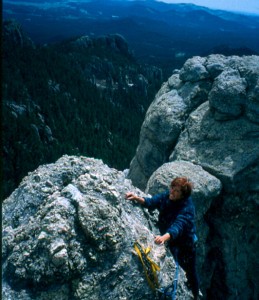My wife and I recently met an Argentine psychiatrist on the top of a small mountain in Patagonia, and I couldn’t resist the age-old question, “Why do people climb mountains?”
He told us jokingly that we were both very crazy, and that we should come to his office as soon as possible.
“Because they are there,” or “If you have to ask the question, you won’t understand the answer,” are the most common stock responses I’ve heard, but the true reason is much more difficult to define.
The sport that started as a hobby for a few eccentric individuals has become so popular that the rocks in many areas are overcrowded. Modern equipment and a large variety of documented routes provide a relatively safe environment for a skilled climber, but the high mountains and large cliffs of the world provide as much danger and excitement as anyone could ever desire.
Climbing seems to satisfy a human need for adventure that has been lost in our civilized world. It is both mentally and physically challenging, and causes the human body to secrete large amounts of a drug called adrenaline into the bloodstream. Adrenaline is an important part of our bodies survival instincts, and seems to give us a sudden boost of strength and energy. The experience can also be very enjoyable, and is therefore somewhat addictive. Fear of heights is a natural preservation instinct, and controlling this fear is a major part of becoming a successful climber. Giving into the fear can cause a climber to fall or make foolish decisions, but conquering it can result in a very joyful experience. And the small doses of Adrenaline might be a key to the fountain of youth.
Overcoming this fear involves a combination of lucid thinking and climbing skills. As the climber gains technical skills, his mind becomes convinced that he is worthy of traveling in the vertical world, and he starts to relax a bit mentally. But the climber can never totally relax, because he or she is constantly reminded that a mistake could be deadly. This constant struggle, combined with the physical challenges of the route provides a pastime that requires almost 100 percent of the body’s resources. This complete focus allows the climber to forget about the everyday struggles of the planet and his own life. Hours can often seem like minutes when you are climbing, and I know of no other sport where the time passes so quickly.
A skilled climber will literally dance up a steep cliff and completing a challenging route provides a sense of fulfillment that is missing in most of our lives. The bonus of sitting on top of a high point and enjoying a pristine view is very rewarding.

